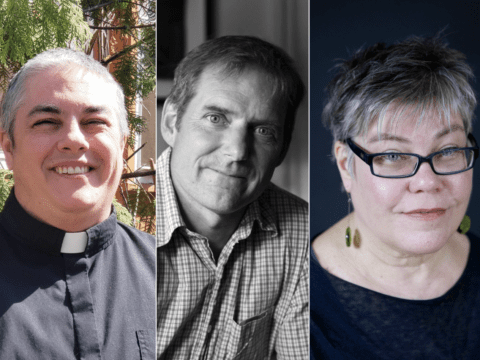When I was much younger, I expected that by this time in my life I would be a lot wiser than I feel right now. Furthermore, I expected that the increased wisdom would be especially noticeable in matters of the soul, all the religious and spiritual and churchly issues that have touched my life. It hasn’t worked out that way, and when I began to catch on that the universe was not unfolding in the way I thought it should, my first impulse was to find somebody or something to blame.
Attaching blame has not been an entirely fruitful exercise, although I did renew my respect for the wisdom of the cartoon character Pogo: “We have met the enemy and he is us.” But I am left with the feeling that something is seriously out of joint. Maybe I’m not asking the right questions.
You may unsubscribe from any of our newsletters at any time.
Over the years, I think it’s fair to say that we worked diligently at religious stuff. (I am using the pronoun “we” because in every United Church congregation I’ve belonged to, there were a few people who had questions like mine. I always felt that we made up a loose band of like-minded folks, and there was a fair measure of comfort to be found in their company. I still think of this small, scattered group as being on a common journey. So, I use “we.”)
It was obvious from the beginning that The United Church of Canada was the only possibility for us. The literalist churches were out of the question. As 12-year-olds, a week of vacation Bible school in the hands of smiling zealots convinced many of us that there had to be an alternative. We agreed that the dogma and doctrine of the Roman Catholic Church was not only suffocating but, in many of its particulars, repugnant. And so on. In the end, the United Church offered the only possible church home for many of us, and that was where we settled.
On the whole, it was a good choice: we had our children baptized, just in case; we taught Sunday school, also just in case; we got involved in assorted social justice issues. We came to see that washing dishes in the church kitchen, working at the yard sale and repainting the Sunday school classrooms really could advance God’s kingdom, even if only a little. Those activities consumed a lot of our time.
When we had a few hours for reflection, it seemed scholarly instruction and serious study opportunities for adults were few and far between. We knew there were gaps in our knowledge of Scripture, but we were confident they would be filled in, so long as we continued as members.
I used to be critical of the clergy for their apparent reluctance to lay the sticky religious issues out for us. After all, they were the folks in the congregation who had formally studied theology and biblical criticism and ancient languages, and I figured that a major role for the clergy was to be the resident professional, teaching and advising the rest of us in such matters. Then I heard of a congregation running its minister out, with the larger church organization either unwilling or unable to stop it. Being a layperson, I knew nothing of the church courts and their machinations. But I understood this much: clergy have families to support, just like the rest of us. If their jobs could be terminated so swiftly and arbitrarily, they would be foolish to offer up controversies from modern biblical scholarship that could scandalize the powerful folks in the pews.
Was that the reason for their reluctance? To avoid scandalizing us?
Of course, from time to time there was controversial material in circulation. Some of it appeared in news magazines or in bestseller books. But it was never completely clear who would be shocked by these publications. So, we read a lot — indiscriminately, perhaps, and sometimes not wisely. It would have been helpful if someone in our church could have advised us about certain writers who, I’m sure, were well known among clergy as unreliable, sensational or downright kooky. But there were no warnings. For better or worse, we were on our own.
We read John A. T. Robinson’s Honest to God when it was first published in 1963, and while some parts were beyond our understanding, we got most of it and were not scandalized. We read Pierre Berton’s The Comfortable Pew; we thought he made some excellent points and were not scandalized. Then there was Hugh J. Schonfield’s The Passover Plot and again, we were not scandalized but decided that his thesis was simply not credible. Morley Callaghan put a different slant on the character of Judas in his novel A Time for Judas. We read that book, enjoyed the new perspective provided by a good novelist, and remained unscandalized. And there was also the magic mushroom theory of John Allegro. We dismissed that one as incredible and not even all that interesting.
We read about Scripture, too, confident that, in due course, all our questions would be answered by the scholars and experts in the church, in our church. We read, for example, that alma, in Hebrew, does not mean “virgin” (didn’t then, doesn’t now), and we wondered when the authorities — our authorities — were going to correct the glitch in translation. Once the translation problem was solved, we could get on with the task of revising all the nonsense about virgin birth and related claptrap. But the correction did not happen. Neither did we hear any suggestion that, just possibly, Matthew was prone to taking quotes out of context and overreaching. Or that he may have been writing propaganda for a first-century community, as opposed to writing for future generations of Christians. That would have been useful to hear.
We knew years ago that Jesus did not speak English and that he probably looked more like a modern-day Palestinian farmer than like a Swedish lumberjack. That was not news. Then we read John Dominic Crossan, and we wondered what a first-century Mediterranean Jewish peasant could possibly have to say to a 21st-century Canadian plumber or nurse or lawyer. We heard no clarification.
We gleaned — a bit here, a bit there — that “the messiah” (or mashiach) was a concept, the meaning of which was not entirely settled in the first century and continues to be debated by scholars today. But the details of what the messiah was expected to do and when he might appear were not unanimously agreed upon. Whatever the details, we wondered if it wasn’t more than a little presumptuous for us Christians to claim Jesus was the messiah when the Jewish people (and who would know better than they?) said he was not. No answer.
Our little band has known for a long time that God is not an old guy with a white beard sitting on a throne in the clouds. The realization was not especially traumatic. Yet we didn’t necessarily object to the image of the old guy, because he’s easy to visualize and he’s not seriously out of step with the books. We didn’t doubt that Paul Tillich’s “ground of all being” was more accurate, but it’s just about impossible to create a corresponding mental picture. Say what you like, but mental pictures are useful.
I don’t think we had much trouble with the Son of God business. Lose a capital “S,” change the article, and Jesus was a son of God, just as we are all children of God. That is, he was human. Maybe he was more completely human or more intensely human, but he was a man with whom we all share our humanity. That worked for most of us, I think.
None of us believed that the Bible is the literal, 100-percent-accurate Word of God since we read of the ancient arguments that went into deciding which documents to include. A wise man once said, “You can believe the Bible is God’s word if you want to, but I have a much higher opinion of God than that.” We took it for granted that most everybody in the church would agree with this, but on that score, I think we were badly mistaken. One thing was certain, however: we saw no systematic attempt to correct the interpretation of the Bible. Eventually we all drifted into the unspoken conspiracy that we would ignore the problems with Scripture.
But then we read some of the work of the Jesus Seminar, an initiative of 150 or so biblical scholars, and we took note of the black, grey, pink and red ratings the seminar used to indicate the likelihood that specific words were actually spoken by Jesus. On one hand, the seminar’s voting scheme seemed like a good idea and we applauded its work. On the other hand, we remembered Bible editions in which all of Jesus’ words were printed in red. By comparison, the words in red that the Jesus Seminar deemed authentic looked like pretty thin gruel. It appeared that if the Gospels continued to be dissected, they’d all disappear in a puff of smoke. Such disintegration would be distressing, to be sure, but I think we would cope.
Author Tom Harpur demonstrated part of this disintegration in The Pagan Christ. Could it really be that Jesus never existed as a man in history? (Oh my goodness.) The professional atheists like Richard Dawkins, Christopher Hitchens and Sam Harris become more and more pugnacious in their assertions that belief in God is utterly wrong, stupid, criminal and so on. And on “our” side, we have Bishop John Selby Spong and Rev. Gretta Vosper and others talking of a God who is hard to visualize, harder to understand and probably not essential to the operation of the church, in any case. All that commotion is not as helpful as one could wish. It contributes to the uneasy sense that the ground is shifting under our feet. As Kurt Vonnegut once wrote, “Everything is going to become unimaginably worse and never get better again.”
Out of all this, my question is simple: what next? One thing I am sure of is that I can’t carry on like this. Maybe the United Church can’t carry on like this either. Bishop Spong has said that either the Christian church changes or it dies. That sounds about right. The Emerging Spirit campaign was one attempt by the United Church to change, I guess, and still many congregations are dying. Maybe Scripture and liturgy and church tradition — all of it — has to be radically reinterpreted every 100 years, or better yet, maybe every generation. In fact, thinkers in the United Church have hinted at this in The Authority and Interpretation of Scripture, published in 1992, in the Song of Faith, from 2006, and possibly in other places as well. But we have been waiting a long time for the authoritative pronouncement from our leaders and for the hard work to begin. If radical reinterpretation of Scripture is the way things are supposed to work, then I hope we can get on with it. It is long past due, if you ask me, and I don’t have a lot of time left to witness the results.
Murray Malcolm is a biochemist and forensic scientist living in Saskatoon. He is still a hopeful member of The United Church of Canada.
***
This story first appeared in The United Church Observer’s July/August 2011 issue with the title “Faith under construction.”












